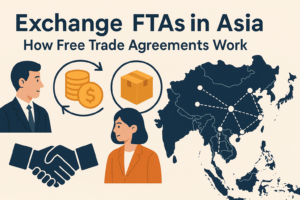If you were watching the numbers roll in on the KOSPI this morning, it didn’t take much to sense it — something was off. Traders were tense. The usual optimism that opens the South Korean markets was missing. Instead, there was an unease, quiet but unmistakable.
The culprit? Not a local scandal. Not an earnings report. But a familiar storm coming from across the Pacific.
News that a major credit rating agency had downgraded the U.S. government’s credit rating sent a jolt through global markets — and Seoul felt it instantly. For an economy as tightly wired into the global machine as South Korea’s, this wasn’t just noise. It was a signal, and the markets responded with caution, retreat, and in some cases, outright anxiety.
Not Just a Number, But a Message
On paper, the downgrade doesn’t mean the U.S. can’t pay its debts. It doesn’t mean a collapse is imminent. But in markets, paper is only half the story. What this downgrade triggered was something more dangerous than default: doubt.
Doubt about U.S. fiscal discipline. Doubt about stability. Doubt about whether the global economy is headed for another drawn-out period of unpredictability — and for a place like Korea, that doubt hits fast and deep.
KOSPI Drops, Tech and Finance Lead the Slide
The South Korean KOSPI index fell hard in early trading. By midday, it had shed over 1.7%, with technology stocks taking the brunt of the blow.
Samsung Electronics, often a bellwether for Korea’s economy, slipped noticeably. SK Hynix followed. These are companies with deep U.S. market exposure. When there’s turbulence in the U.S., they feel it — not later, but immediately.
Korea’s financial sector didn’t escape, either. Bank stocks slid as investors pulled back from risk, worrying about global lending conditions tightening further. Even insurers took a hit, as bond markets — always allergic to uncertainty — started to shiver.
The Won Wobbles
Currency markets told the same story. The Korean won weakened against the U.S. dollar, continuing a slow drift that’s been gaining speed in recent months. A weaker won puts pressure on imports and adds complexity to an economy already dealing with cost-push inflation.
And while the Bank of Korea stayed quiet early in the day, traders were already whispering about possible interventions if things worsened.
We’ve Been Here Before — Sort Of
This wasn’t the first time something like this has happened. Back in 2011, after the U.S. suffered a similar downgrade, Korea’s markets reacted much the same way: quickly, sharply, then cautiously forward.
But there’s a difference this time.
The world today is more fragile. Post-COVID recovery has been slow, uneven. Inflation’s been stickier than expected. Geopolitical tensions — from Ukraine to Taiwan — are always hovering just beneath the surface. So even a relatively minor event like a credit rating change doesn’t feel small anymore. It feels like a warning.
What Experts Are Saying
I called a contact at a local asset management firm late this morning. His take was short and blunt: “This is the kind of thing that shakes confidence. It doesn’t change fundamentals, but it changes behavior. And behavior moves markets.”
Another market strategist I spoke with pointed out that this isn’t just a South Korean issue. “Look at Hong Kong. Look at Tokyo. Look at the S&P futures. Everyone’s feeling it. But countries like Korea — where trade is the bloodline — we feel it harder.”
Investors Hold Their Breath
What happens next? No one knows, not really. That’s what makes days like this so tense.
Retail investors, who’ve become a huge force in South Korea’s markets since the pandemic, largely stayed on the sidelines today. Trading volumes were down. It wasn’t panic selling. It was waiting. Watching. No one wants to be the first to run — but no one wants to be the last, either.
The Government Tries to Calm the Waters
By late afternoon, the Ministry of Finance issued a statement urging calm. They stressed Korea’s economic fundamentals — low debt, solid foreign reserves, stable inflation — and tried to draw a line between global shocks and local stability.
The Bank of Korea followed with reassurances, saying the financial system remains sound and well-buffered against external risk.
It was the right thing to say. Whether it’s enough remains to be seen.
Final Thought
Markets don’t like surprises — especially when they come dressed as warnings. Today’s sell-off in Seoul wasn’t about Korea. It was about what Korea represents: a hyper-connected, globally sensitive economy. When something shakes the system, South Korea feels it fast.
Today, the markets pulled back. Tomorrow? We’ll see. But if nothing else, the message was clear: even a small downgrade in Washington can cast a long shadow in Seoul.




